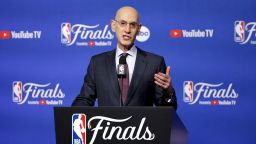Science
NCAA Faces Deadline on Controversial Gambling Rule Proposal

The NCAA is under pressure to make a pivotal decision regarding a proposed rule change that would permit college athletes and staff to wager on professional sports. With a deadline of 5 p.m. ET on November 21, 2023, the NCAA must determine whether to implement this change or rescind it entirely. This proposal emerges amidst rising accusations of sports gambling within Major League Baseball and the National Basketball Association.
Currently, college athletes, coaches, and staff are prohibited from betting on any sport governed by the NCAA, which includes high-profile competitions in baseball, football, basketball, and hockey. While betting on horse racing remains permissible, the NCAA argues that the landscape has shifted as sports betting becomes legal in more states, making it increasingly accessible to college students. Many in college athletics remain skeptical, with one anonymous coach expressing doubt about the proposal’s feasibility.
To block the proposal, two-thirds of the Division I member schools must submit paperwork by the deadline. This means that 241 out of 361 Division I institutions must voice their opposition. A source indicated that as of now, the necessary threshold is not being met. If the required responses do not materialize, the change will automatically take effect on November 22, 2023.
In a statement, Roberta Page, director of athletics at Slippery Rock University and chair of the Division II Management Council, emphasized that the change acknowledges the contemporary realities of sports while still prioritizing the integrity of college competition and the welfare of student-athletes. “This change recognizes the realities of today’s sports environment without compromising our commitment to protecting the integrity of college competition or the well-being of student-athletes,” Page said.
The proposal’s timing has drawn scrutiny, particularly following the recent unsealing of an indictment that implicated two MLB pitchers and several college basketball players in separate gambling schemes. The allegations, which include game-fixing and rigged poker games, have prompted significant backlash against the NCAA’s intentions.
In response to the growing concerns, Greg Sankey, commissioner of the Southeastern Conference, urged NCAA president Charlie Baker to reconsider the proposal. In a letter obtained by ESPN, Sankey stated, “On behalf of our universities, I write to urge action by the NCAA Division I Board of Directors to rescind this change and reaffirm the Association’s commitment to maintaining strong standards that keep college participants separated from sports wagering at every level.”
Following the public outcry, the NCAA announced a delay in its decision, not due to the backlash but because less than 75 percent of cabinet members supported the change. This invoked an automatic 30-day rescission process. Notably, despite Sankey’s objections, two representatives from the Southeastern Conference voted in favor of the proposal.
The NCAA’s cabinet comprises representatives from multiple power conferences, with varying voting weights. Of the 20 cabinet members who cast votes, the two from the SEC supported the proposal, while both representatives from the Atlantic Coast Conference opposed it. The Big Ten voted in favor, and the Big 12 had a split vote.
Since the initiation of the rescission period, the landscape of sports gambling has continued to unfold dramatically. Recent reports indicate that 14 individuals, including student-athletes, have been charged by the New Jersey Attorney General’s office for their involvement in an illegal online sports betting scheme linked to members of the Lucchese crime family. Furthermore, six college basketball players have been permanently banned from NCAA competition due to game-fixing allegations.
As the deadline approaches, the NCAA must navigate a complex environment shaped by legal, ethical, and competitive considerations. The outcome of this decision could have far-reaching implications for the future of college athletics and gambling regulations.
-

 Top Stories4 weeks ago
Top Stories4 weeks agoNew ‘Star Trek: Voyager’ Game Demo Released, Players Test Limits
-

 World4 weeks ago
World4 weeks agoGlobal Air Forces Ranked by Annual Defense Budgets in 2025
-

 World4 weeks ago
World4 weeks agoMass Production of F-35 Fighter Jet Drives Down Costs
-

 Science4 weeks ago
Science4 weeks agoTime Crystals Revolutionize Quantum Computing Potential
-

 World4 weeks ago
World4 weeks agoElectrification Challenges Demand Advanced Multiphysics Modeling
-

 Business4 weeks ago
Business4 weeks agoGold Investment Surge: Top Mutual Funds and ETF Alternatives
-

 Top Stories4 weeks ago
Top Stories4 weeks agoDirecTV to Launch AI-Driven Ads with User Likenesses in 2026
-

 Lifestyle4 weeks ago
Lifestyle4 weeks agoDiscover Reese Witherspoon’s Chic Dining Room Style for Under $25
-

 Entertainment4 weeks ago
Entertainment4 weeks agoFreeport Art Gallery Transforms Waste into Creative Masterpieces
-

 Health4 weeks ago
Health4 weeks agoGavin Newsom Critiques Trump’s Health and National Guard Plans
-

 Business4 weeks ago
Business4 weeks agoUS Government Denies Coal Lease Bid, Impacting Industry Revival Efforts
-

 Science4 weeks ago
Science4 weeks agoRemembering David E. Brest: A Life Dedicated to Nature and Family









